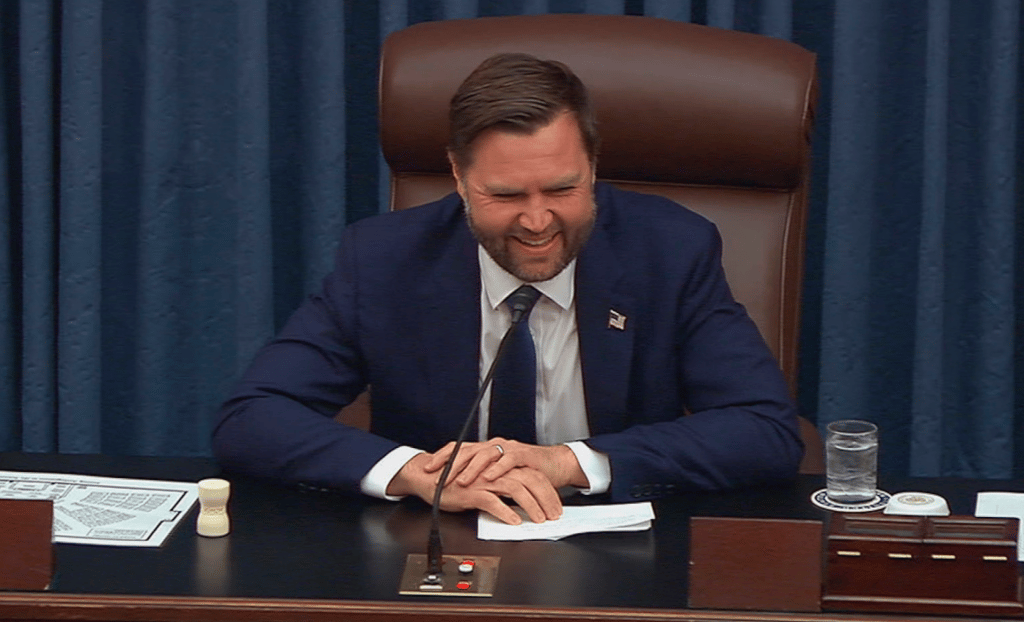Vance's Tie-Breaking Vote: What the Senate Megabill Means for America
7/2/20253 min read


Vance's Tie-Breaking Vote: What the Senate Megabill Means for America
Introduction:
In a dramatic turn of events, Vice President JD Vance cast the decisive vote to pass a controversial megabill in the Senate, securing a 51-50 approval. This legislative package, part of the 2025 Trump tax cuts and budget reconciliation, now heads back to the House, where its future remains uncertain. The bill, dubbed the "One Big Beautiful Bill," promises significant financial benefits for states like Alaska but has sparked fierce debate over its national implications, including cuts to Medicaid and SNAP programs. As the political landscape shifts, this vote underscores the delicate balance between state and national interests, raising questions about legislative priorities and the impact on American lives.
The Senate's Narrow Victory
The Senate's passage of the megabill, after a marathon session and intense negotiations, marks a pivotal moment in the 2025 legislative agenda. Vice President JD Vance's tie-breaking vote was crucial, reflecting the razor-thin margins that define contemporary politics. The bill, which includes extensions of the 2017 Trump tax cuts and substantial spending increases, was approved despite opposition from some Republicans, including Senators Thom Tillis, Rand Paul, and Susan Collins. Their dissent highlights the internal fractures within the GOP over the bill's $3.3 trillion price tag and its policy implications.
State vs. National Interests
At the heart of the controversy is the tension between state and national priorities. Senator Lisa Murkowski of Alaska, whose vote was pivotal, admitted the bill was "awful" but justified her decision by citing her obligation to her state. Alaska stands to gain significantly, with potential additions to the Alaska Permanent Fund that could benefit residents directly. However, critics argue this comes at the expense of broader national welfare, particularly with proposed cuts to essential programs like Medicaid and SNAP. This dichotomy raises a critical question: Should senators prioritize their constituents' immediate needs over the long-term health of the nation?
The House's Role and Challenges
The Senate's version of the megabill now faces a uncertain path in the House. Moderate Republicans and hard-line conservatives have expressed growing opposition, concerned about the bill's impact on the deficit and its rushed timeline. The House must reconcile the Senate's changes with its own version, a task complicated by the self-imposed July 4 deadline. This pressure cooker environment could lead to further amendments or even derail the bill entirely, depending on the political will and negotiations that ensue.
Policy Implications
The megabill's policy implications are vast and multifaceted. On one hand, it aims to extend tax cuts that benefited a wide swath of Americans in 2017, potentially stimulating economic growth. On the other, it includes spending increases that could exacerbate the national debt, a concern for fiscal conservatives. Additionally, the bill's provisions on healthcare and social safety nets, such as Medicaid and SNAP, have drawn ire from both sides of the aisle. These cuts could disproportionately affect vulnerable populations, sparking a broader debate on the role of government in social welfare.
Political Dynamics and Legacy
This legislative battle is not just about policy but also about political legacy. For President Trump, the bill's passage is a testament to his influence, despite the controversies surrounding his administration. For senators like Murkowski and Collins, their votes could define their careers, with potential repercussions in future elections. The dynamic between the Senate and House, coupled with the vice president's role, illustrates the intricate dance of power in American politics. It also highlights the growing polarization, where party lines often blur in the face of state-specific interests.
Public Reaction and Future Outlook
Public reaction to the megabill has been mixed, with polls indicating a divide between those who see it as a necessary economic boost and those who view it as fiscally irresponsible. As the bill moves to the House, public opinion could sway the outcome, especially if grassroots movements mobilize against its more contentious aspects. The coming weeks will be critical, as lawmakers navigate the political minefield to either pass or reject this sweeping legislation.
Conclusion:
The Senate's passage of the megabill, sealed by Vice President JD Vance's tie-breaking vote, marks a significant chapter in the 2025 legislative saga. It underscores the ongoing tension between state and national interests, the challenges of bipartisan cooperation, and the far-reaching implications of fiscal policy. As the bill heads to the House, its future remains uncertain, with potential for both triumph and turmoil. This moment invites us to reflect on the responsibilities of our elected officials and the impact of their decisions on our daily lives.
Thought Questions:
Should senators prioritize their state's interests over national welfare, or is there a balance to be struck?
How might the megabill's passage affect vulnerable populations, and what does this say about the role of government in social safety nets?
What does this legislative process reveal about the state of American politics today, and what changes might be needed to ensure more effective governance?
hello@boncopia.com
+13286036419
© 2025. All rights reserved.